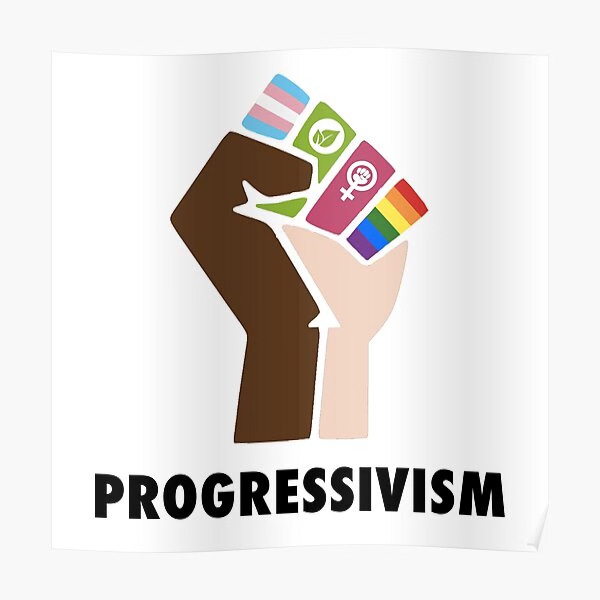The Question of Progress: Cui Bono?
Progressives hold up transient political and cultural goals as objectively good while insisting nothing is objectively good. This makes progressivism nearly unintelligible.
Note: This is part two of a two-part series. The first essay explored why conservatives make a strategic messaging mistake when they imply there is a Golden Era from the past we should emulate today.
Part two addresses the idea of "progress," which presupposes that we are getting closer to some end or goal. Yet progressivism has no clearly defined end or goal. How can we know, then, if we are progressing, regressing, or merely spinning our wheels?
I do not expect these essays to change national campaign themes or major cultural-political movements. That’s not my purpose. My purpose is to help others think clearly about the popular messages and labels of our day so that they can communicate with greater precision and truthfulness.
The Age of Progress
Ours is the Age of Progress. It has been for a century and a half.
That’s another way of saying: Progressivism is old. In fact, progressivism is much older than conservatism. The modern conservative movement in the United States began as a response to and critique of progressivism six decades after progressives launched their effort to remake the United States into an administrative state.
Mainline academic historical narratives typically limit progressivism to a short period from the 1890s through WWI, often referred to as the Progressive Era.
I disagree with mainline historians—does that surprise anyone?
I argue that progressivism arose out of the ashes of the Civil War, in the 1870s, first as an intellectual and academic movement imported from Germany, then as a movement of social and cultural reform, eventually transforming into a political movement and influencing both the Republican and Democratic Parties.
For instance, in the election of 1912, longtime Republican Teddy Roosevelt challenged Democrat Woodrow Wilson by describing Wilson as insufficiently progressive.
In that sense, progressivism is certainly nothing new. It stretches from the 1870s to today, 2024.
Progressivism’s Ubiquity
Over the past 150 years, progressivism has become the dominant culture in the United States. It is our zeitgeist, the spirit of our age. Ours is and continues to be the Age of Progressivism.
Today, one can accurately describe as progressive:
An entire national political party, and large segments of the opposition party
Many legislative halls, including Congress and numerous state legislatures
Institutions of higher education
Most of K-12 education
Legacy media and news organizations
Hollywood
Professional and amateur sports
Corporate boardrooms and training rooms
Chambers of Commerce
Numerous churches
Youth organizations, such as Girl Scouts
Organizations for the elderly, such as AARP
Three million unelected, unionized federal bureaucrats, and millions more at state, county, and municipal levels
In our postmodern United States, progressivism is everywhere. It is in the air and the water. Progressivism is now ubiquitous.
Cui Bono?
The question for shapers of our progressive culture and makers of progressive policies is an ancient one: Cui bono? To what end or goal? For whose good, or for the benefit of whom? What is the target at which progressivism aims?
The core idea of progressivism has always been progress. Yet, what does progress mean?
Progress implies motion and change toward a goal. Many progressives today, however, are reluctant to state publicly what the goal of progressivism is. Reflect on how odd that is.
The American Founders had a stated goal: a self-governing constitutional republic that provided equal protection of the laws for the equal individual rights of every citizen and could stand up to hostile foreign regimes.
Even Karl Marx, of whom many progressives are disciples, posited a goal: a final communist revolution resulting in the withering away of the state, the abolition of private property and all class distinctions, and replacing the individualistic concept of “I” with the communal “we.”
But for today’s progressives in the United States, it is virtually impossible to get them to state what the goal of their progressivism is. If progressivism were wholly successful, what would the United States—or the world—look like? What kind of regime would the United States be? What rights, duties, burdens, restrictions, or permissions would citizens have in a fully progressive nation? Would there be citizens, or subjects?
Progressives don’t say.
Progress or Regress?
Without a goal, how can we know if we are progressing or regressing? How can we judge change as better or worse if there is no standard by which change can be evaluated?
Without a bono—without a good, an end, a purpose, a goal—we are like teammates Yogi Berra and Phil Rizzuto. When they became lost driving to a baseball game, Phil said they were lost and he didn’t know where they were or which way to go, to which Yogi responded: “Yeah, but we’re making great time!”
That’s a funny Yogism, of course. Still, how could Yogi know if they were making great time when they didn't know where they were going? Without a goal and a path to get there, there's no way of knowing if we are progressing, regressing, or merely spinning our wheels.

Better or Worse?
Let us do what Yogi and Phil should’ve done: Pause and back up for a moment, retrace our steps.
Simply as human beings, we all prefer the status quo over change for the worse. The way things are right now is preferable to things getting worse.
Conversely, we all prefer change for the better over the status quo. We want change—we want progress—if and when change means things will get better.
The concepts of better and worse point beyond themselves to something more important, more fundamental, a standard by which the human mind understands and distinguishes between better and worse: The good.
Things get better when they become closer to what is good. They get worse when they move farther from the good.
What then is the good at which progressivism aims? Cui bono? What do actual progressives say is the good they want to achieve?
Progressive Goods or Ends
Progressives often cite diversity as a good, though they usually mean a narrow and superficial kind of diversity such as skin color, gender, and sexual preferences. They rarely explain why this diversity is inherently good, and they never consider those who are not progressive to be “diverse.”
They advocate for free healthcare, free education, free housing, free WIFI, and free smart phones—which presumably are good things for progressives—yet they value tickets to a Taylor Swift concert enough to pay for them.
It’s curious what progressive Americans value enough to work, save, and buy versus what they expect for free, even as the rest of us know nothing is actually free, that there is no such thing as a free lunch.
Progressives seem to assume that it is good to erode the morality springing from and supporting the natural family, promoting sexual libertinism and exhibitionism that disconnects the powerful passions of sex from procreation and child-rearing responsibilities.
Progressive also seem convinced that getting beyond the Constitution is a good thing. Progressives lament that the Constitution is old, outdated, irrelevant to the modern world, and worse: They insist that the Constitution is irredeemably immoral because it is irredeemably racist.
Progressives today rely on critiques like Charles Beard’s argument, first published in his 1913 book, An Economic Interpretation of the Constitution, that the Constitution serves the interests of the rich while keeping the poor powerless.
Contradiction
Simultaneously, progressives embrace a kind of postmodern nihilism, asserting there is no objective good. Opinions about good, right, and moral are seen as arbitrary cultural prejudices with no objective foundation.
This leads to a contradiction: Progressives hold up transient political and cultural goals as objectively good while insisting nothing is objectively good. This makes progressivism nearly unintelligible and leaves us with an odd question: What does progress mean for nihilists? What can it mean for nihilists?
The absence of a clear goal for progressivism allows progressives to add items to their agenda—or discard others—easily. They can't be hypocrites when their ideology has no objective goal.
Progressives like Hillary Clinton and Barack Obama can support the natural family in one moment, and sexual fetishes that have nothing to do with the family in the next, and progressives don’t care about the contradiction.
Progressive Joe Biden can lament his kids growing up in a “racial jungle” one moment, and then brag about how much he cares about civil rights for racial minorities and transexuals in the next, and progressives don’t care about the contradiction.
Progressive Kamala Harris can incarcerate record numbers of black men for non-violent crimes—the vast majority of whom were never convicted by a jury—and then say she is trying to help racial minorities, poor people, and others who feel disaffected, and progressives don’t care about the contradiction.
What Is the Goal of Progressivism?
So, again, cui bono? What is the goal of progressivism? Who is meant to benefit, and how?
After three decades of studying progressivism, I will state the goals as evidenced by the words and actions of progressives. And I will do so with this qualification: It is likely that many progressive activists, today, will disagree with my description of progressivism.
The reason is that most progressive activists today don’t pause to study the history and philosophic origins of their own cause. I do.
Politically, progressivism aims for a regime of scientific central planning and social engineering—a government with no clear limits, staffed by unelected unionized bureaucrats dictating how the rest of us live, and who gets to live.
The progressive dream is a bureaucratic administrative state that decides what foods we eat, what medicines are injected into us, and how all of that and everything else is made, distributed, and consumed.
Culturally, progressivism seeks a nation of submissive subjects who no longer believe in right and wrong—except for the rightness of the progressive state itself—where the unfettered human will is celebrated in the form of sexual activities disconnected from all moral constraints and responsibilities of marriage, family, and child-rearing.
In short, you may do anything you please, sexually, anywhere, anytime, but don’t ever challenge the progressive regime’s authority to confiscate your property or command how you run your business. The regime regulates and controls everything other than what you do with your genitalia.
Scientifically, progressivism aims to produce technologies that serve the desires of the uninhibited human will—including men who pretend to be women, and vice versa—rejecting classical virtues, personal responsibility, and the self-restraint required for self-government.
Conclusion
What I describe may not be fully realized yet, but the trajectory of the progressive movement from its German origins to influential American progressives like Teddy Roosevelt, Woodrow Wilson, Herbert Croly, Margaret Sanger, John Dewey, Franklin Roosevelt, Lyndon Johnson, and Barack Obama—as well as thousands of progressive academics in colleges and universities in the United States today—point toward a regime of fascism coupled with a culture of nihilism and moral emptiness.
That might not sound very good to you, but it is the goal toward which progressivism points.









